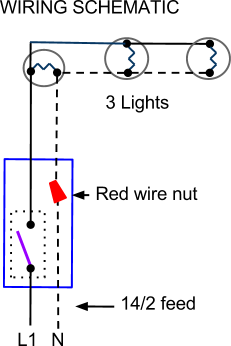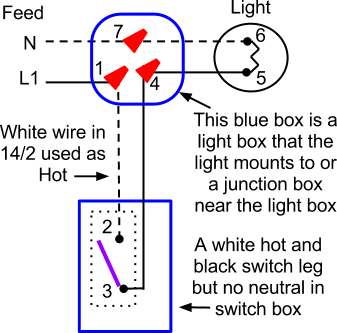I have installed three lights (60 Watt Bulbs) on the same line (wire) connected to one light switch. The fuse blew when I hit the switch. I’ve connected all of the white to white and black to black. I believe the problem may be with the ground. I’ve grounded each light fixture. I believe that I was just supposed to pig tail the ground to the ground in each light fixtures and only affix the actual ground wire in the switch box to the green ground nut. Is that correct? An informed response would be greatly appreciated!
3 Answers
Unless you connected a hot to ground, it probably is not related to the ground. Without seeing some pictures or diagrams, my best guess is that one of your white wires is actually a hot (and someone didn't mark it as so), so by connecting the whites (which are supposed to be neutral) together, you've created a short.
Sometimes with switches, when the power comes into the ceiling box first, there will be one cable to the switch from the ceiling box. In this configuration you will find a black and white wire, but both are actually hot since the switch only interrupts the hot wire. Take a look at the switch wiring - are both wires black, or is one black and one white? If one black and one white, then one of your white wires is actually hot and should not be connected to the rest of the white (neutral) wires.
I would start by disconnecting your work, verifying the fuse doesn't blow in this configuration and then start connecting the lights back up at one at a time.
Remember that electricity is dangerous and there's nothing wrong with calling an electrician if you are in over your head!
Following up on what @Steven mentioned. I am not entirely sure of your level of proficciency however i have included two diagrams that illustrate the point he was making and two of the ways it can be wired. The first is how i assume it would be wired however in older houses you can easily find that it is wired too the light first as is shown in second image

And here we have the second example which is more common in older dwellings

-
White switch wire should be on the light side (neutral potential when "off"), connection 4. black wire should be on L1 side, connection 1 (always hot). Also white wire should be "flagged" with either black or red tape indicating it is now a hot leg.– SteveRCommented Mar 12, 2012 at 12:15
Typically the ground is never involved unless there is a problem! The only exception is something like a one wire circuit that USES the ground instead of a nuetral! Ony find this on things like and occupancy sensor switch designed to be installed on switch locations that are ONLY a switched leg with no nuetral in switch box (VERY COMMON) an exception is made for these devices because it is teensy control circuit only...no significant amperage goes through the ground...other than that? You can not even have a ground in most circuits and aside from being dangerous? It will all work just fine...but the problem with no ground is that IF part of circuit touches metal (ground) it will "short" to ground with electricity running THROUGH your ungrounded device or equipment! You would not even know because the circuit breaker probably won't care/won't trip and so? You grab metal ungrounded energized part and it just like grabbing LIVE electrical conductor beause it HAS BECOME a conductor! YOU become a a conductor and maybe your heart stops and you DIE of "electrocution" which is just a long answer that NO the ground is not what was causing your problem ...in all likely hood it is an "open" rather than a "short" ...an "open" is where current carrying part is not connected for some reason...a blown fuse for example is most typical...
-
connecting all the whites to white and blacks to black in a switch loop causes a dead short on a switch loop and will trip the breaker.– Ed BealCommented Jan 12, 2017 at 14:06
